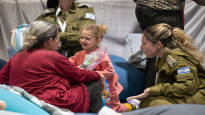The hostages’ experience was harrowing, but the captors were not violent.
The terrorist organization Hamas has now released about 70 of its hostages. Those freed have avoided publicity and tried to recover from the experience with their families. However, a few bank prisoners have told the Israeli media about their experiences.
78 years old Ruti Munder spent all his imprisonment with his daughter Keren’s and his 9-year-old grandson Ohadi with. They were abducted from the Nir Oz kibbutz near the Gaza border. They were released over the weekend.
Ruti Munder’s husband Avraham was kidnapped at the same time as the rest of the family and is still being held hostage. Their son was killed when Hamas attacked the kibbutz. The Munders found out about the boy’s death by chance when one of the kidnappers listened to a radio broadcast about the matter.
On October 7, attackers entered the kibbutz and forced its residents into vehicles. The attackers took the blanket used to cover the prisoners from the Munders’ apartment. The captors apparently did not want the prisoners to see them.
According to Ruti Munder, in the early days of imprisonment, the prisoners received enough food. For example, they were given chicken and rice, which according to Ruti was “just fine”. They also ate a lot of canned goods and cheese. The children received candies.
During the almost 50-day imprisonment, the food situation deteriorated, Ruti Munder tells Israel’s TV channel 13. The reason was probably Israel’s tight blockade, which also caused the kidnappers’ food supply to deteriorate.
The prisoners were kept in a “suffocating” room, which was apparently not in a tunnel, as it had windows. The windows were covered with cloths that could not be opened. However, Ruti Munder says that she managed to make a hole in the fabric.
Some of the prisoners slept on plastic chairs, like Rudik. The young men had to sleep on the floor. Ruti Munder got a sheet to cover her, but not everyone had that either, she says.
Physical recovery does not tell the whole story of imprisonment
The freed children have been treated at the Sheba Medical Center Children’s Hospital. News agency AP has interviewed the director of the children’s hospital Itai Pessach.
Pessach says he is optimistic about the children’s recovery, as their physical condition will improve after they are released.
On the other hand, Pessach says that he heard “many difficult and unpleasant stories from the time when the children were prisoners of Hamas” from the nursing staff. However, Pessach did not want to specify what he meant.
Source: AP
